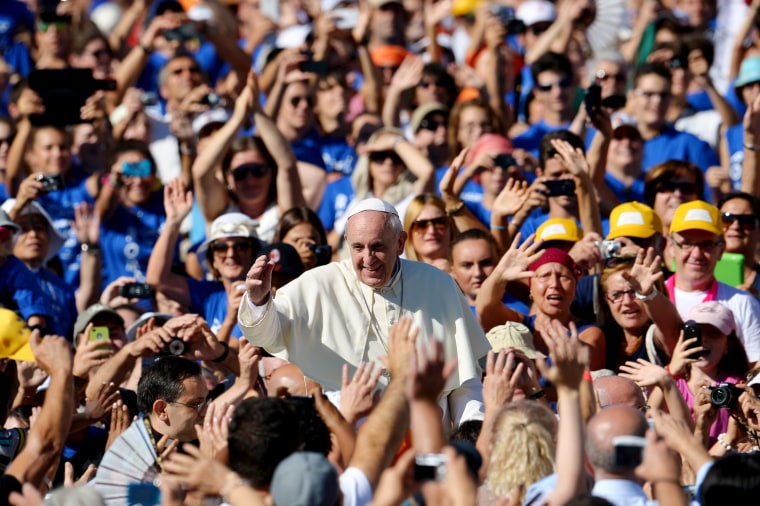ROME — Pope Francis already has distinguished himself from his predecessor with a more down-to-earth style. Now he is both unnerving the Vatican and delighting the faithful by picking up the telephone and spontaneously calling people, earning the nickname “the Cold Call Pope.”
This month, he called to comfort a pregnant Italian woman whose married boyfriend had unsuccessfully pressured her to have an abortion. The woman, who is divorced and will be a single mother, wrote to the pope, fearing she had fallen afoul of the church. Not knowing the correct address, she marked the envelope “Holy Father Pope Francis, Vatican City, Rome.” The pope offered to personally baptize the baby when it is born next year, according to an account in La Stampa, a newspaper in Turin.
In August, Francis phoned a woman in Argentina who had been raped by a police officer. The pope told her that she was not alone and that she should have faith in the justice system, according to an Argentine television news report rebroadcast in Italy.
On Aug. 7, Michele Ferri of Pesaro, Italy, answered his phone and was startled to hear, “Hello, Michele, it’s Pope Francis.” Mr. Ferri said in a telephone interview he had thought it was a joke. “But then he spoke about the letter that I’d written, a letter I hadn’t told anyone about, not even my mother or my wife, and I knew that it was him,” he said.
Mr. Ferri had written the pope, he said, after a “series of tragedies in the family,” most recently the killing of his brother in a gas station robbery in early June. “The pope said that the letter had made him cry,” he said.
The 10-minute phone call “offered comfort and hope, to better face life without my brother,” he said. “Of course the pain remains, but it was a great emotion to hear his voice.” Later in August, Mr. Ferri said, the pope also called his mother to offer words of support.
While the papal phoning has been widely greeted with delight, it is also proving somewhat perilous, with unsubstantiated news reports of calls supposedly made by Francis — including one last week to President Bashar al-Assad of Syria, and another to a young distraught French gay man. The Vatican denied that the pope had made those calls. Some Vatican officials are expressing concern that individuals are impersonating Francis to advance political or ideological agendas.
Other Vatican analysts fear that the advent of papal phone calls could spawn disillusion among those not receiving a call.
“There’s an innumerable number of people who have suffered violence or injustice who might write to the pope for a word of comfort, and it’s clear that he can’t answer all of them,” said Alberto Melloni, a Vatican historian and the director of the John XXIII Foundation for Religious Studies in Bologna, a liberal Catholic research institute. “They could think, ‘See, I’m feeling awful and the pope didn’t even call.’ ”
On Thursday the Argentine newspaper Clarín reported that Francis had spoken by phone with Mr. Assad in an effort to prevent a military confrontation with the United States. The Vatican’s spokesman, the Rev. Federico Lombardi, emphatically denied the report.
Then on Friday, Mr. Lombardi denied newspaper reports in France that the pope had called a young Catholic gay man in Toulouse to reassure him. The man, Christopher Trutino, a 25-year-old salesclerk, had told a local paper, La Dépêche du Midi, that after he wrote a letter to the pope explaining his struggles to reconcile his sexuality and faith, Francis phoned him to counsel him. “Your homosexuality, it doesn’t matter,” he recalled the pope saying. “One way or another, we are all children of God.”
Some on Twitter and elsewhere on the Internet greeted reports of the call as a welcome change in the doctrinal rigidity of the church on the issue of homosexuality. But the Vatican’s denial of the reports fanned speculation that the call had been a hoax, while also prompting some to question whether the Vatican was dissembling to distance itself from a delicate topic.
Mr. Trutino is avoiding the media, and could not be reached for comment on Monday. But Cyril Doumergue, the journalist from La Dépêche du Midi who interviewed him, said he had sounded authentic and genuinely moved. But he said he believed Mr. Trutino may have been deceived. He said the young man told the newspaper that during the call — which he said began at 2 p.m. — the pope explained that he would later be receiving King Abdullah II of Jordan. But Ansa, the Italian news agency, said the king arrived at 11 a.m. and the meeting was over by 12:06 p.m.
“Christopher did not record the conversation, so it is impossible to know 100 percent what happened,” Mr. Doumergue said.
Father Lombardi said that it was the pope’s prerogative to phone whomever he chose and that the Vatican would not comment on every reported phone call. But he said he would intervene when rumors or hoax calls dealt with issues of international relevance like Syria or could have important doctrinal implications.
Elisabetta Povoledo reported from Rome, and Dan Bilefsky from Paris. Gaia Pianigiani contributed reporting from Rome.
A version of this article appears in print on September 10, 2013, on page A6 of the New York edition with the headline: "The Pope Gets on the Line, And Everyone Is Talking."
